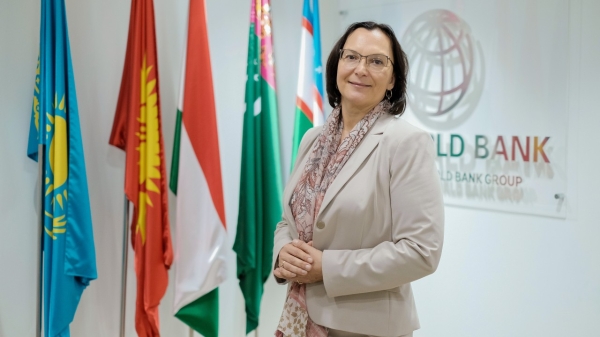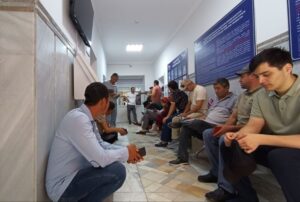Globally, one woman or girl is killed every 10 minutes.
In 2023, at least 51,100 women fell victim to femicide, a form of homicide that specifically targets women. Disturbingly, over half of these murders were perpetrated by intimate partners or family members, underscoring the persistent threat of gender-based violence (GBV) within domestic spaces.

How many women and girls experience GBV in Central Asia?
Reliable data on GBV in Central Asia remains hard to find, but local media occasionally highlight distressing cases that illustrate the gravity of the issue. Reports include brutal killings and acts of torture committed by partners or family members against women and girls.
Why do gains in girls’ education not lead to a reduction in GBV? What enables men across Central Asia to commit violence against their partners with impunity? Why do women often accept this behavior and avoid reporting it?
Addressing these questions requires a deeper exploration of the social norms and gender stereotypes towards women’s roles that prevail in societies in the region. Understanding these deeply rooted dynamics is key to effectively challenging and changing behaviors that perpetuate violence and inequality.
The Impact of Social Norms and Gender Stereotypes
In Central Asia, as in many places worldwide, social conditioning fosters widespread acceptance of GBV among both women and men. The World Bank’s 2021 surveys on gender norms in Tajikistan and Uzbekistan revealed that many young men and women enrolled in university and vocational courses agreed with statements suggesting that a husband is justified in beating his wife if she argues, neglects children, or leaves the house without informing him.
Social norms and gender stereotypes also limit opportunities for women to engage in the labor market. Over a third of respondents in the World Bank’s Listening to Central Asia Surveys in 2022 agreed that women should earn less than men to maintain family harmony. Indeed, women entering the workforce across the region face wage discrimination along with widespread misconception that they are unable to perform certain jobs.
For example, in Kazakhstan, national statistics reveal that a wage gap of over 20% in favor of men, with some regions showing disparities as high as 50%. At the same time, almost 70% of respondents in the Kyrgyz Republic believe men are more suited to executive roles than women.
Low pay and employment rates among women directly hinder economic growth and exacerbate poverty in Central Asia. Specifically, in Uzbekistan, if women participated in the country’s economy on par with men, the national income would rise by 29%. Simply equalizing wages between men and women, who currently earn on average 34% less, could lift over 700,000 people out of poverty.
The data shows that social norms and gender stereotypes are hindering Central Asia from reaching its full economic potential and depriving the region of the human capital needed to compete in today’s global economy. In particular, the economic impact of GBV is staggering, costing billions of dollars annually and reducing the region’s GDP by an estimated 4% each year. However, the personal and societal costs of GBV are even more profound.
The World Bank’s Support to Promote Women’s Rights in Central Asia
Despite the challenging reality, it is important to recognize the progress Central Asian countries are making to combat GBV and promote gender equality. As an illustration, in 2022, with support from the World Bank, Uzbekistan amended its Labor Code to ensure equal pay for equal work and removed restrictions on women’s employment in industrial jobs.
Moreover, in 2023, Bank-supported reforms in Uzbekistan led to the adoption of a law criminalizing domestic violence and strengthening victims’ protections against physical, sexual, economic, and psychological abuse.
Similarly, in 2023 and 2024, we backed Tajikistanin revising its Law on Prevention of Domestic Violence and expanding women’s access to professions that had previously been restricted to them.
In Central Asia, as globally, we collaborate closely with authorities to prioritize gender equality and GBV prevention in World Bank-funded projects. In particular, in Kazakhstan, thanks to the South-West Roads Project, strict measures were introduced for project contractors to prevent harassment and violence against female workers.
We also support civil societies across the region in their efforts to protect women and children from GBV. For example, in the Kyrgyz Republic, earlier this year, alongside other international partners, we supported a hackathon aimed at developing innovative digital solutions to combat sexual harassment and ensure the safe use of public transport for women and young girls in Bishkek.
Much work remains to be done, but we welcome the political will demonstrated by Central Asian countries to dismantle harmful gender norms and stereotypes that normalize violence against women and perpetuate gender inequality. The World Bank reconfirms its commitment to supporting our government and civil society partners to achieve these goals. Together, we can build a more just and prosperous future for everyone in the region, regardless of gender.
Written by: Tatiana Proskuryakova, World Bank Regional Director for Central Asia
First published on LinkedIn.




